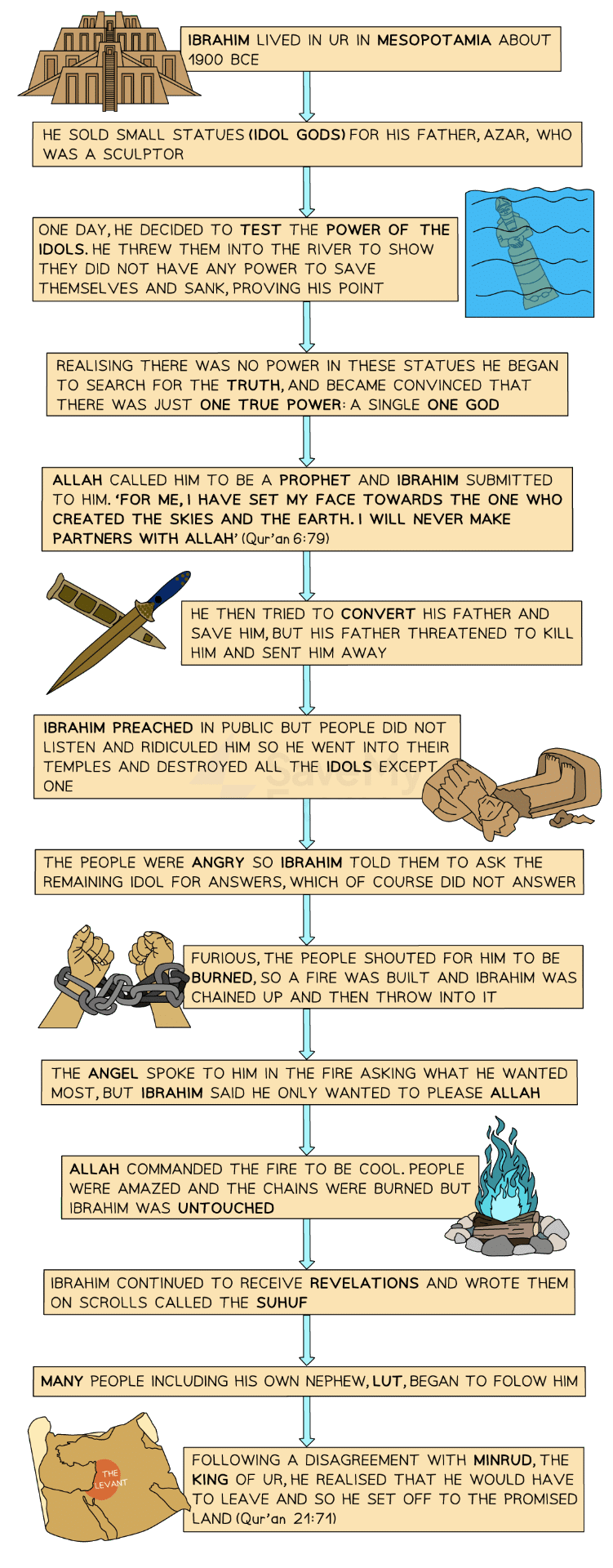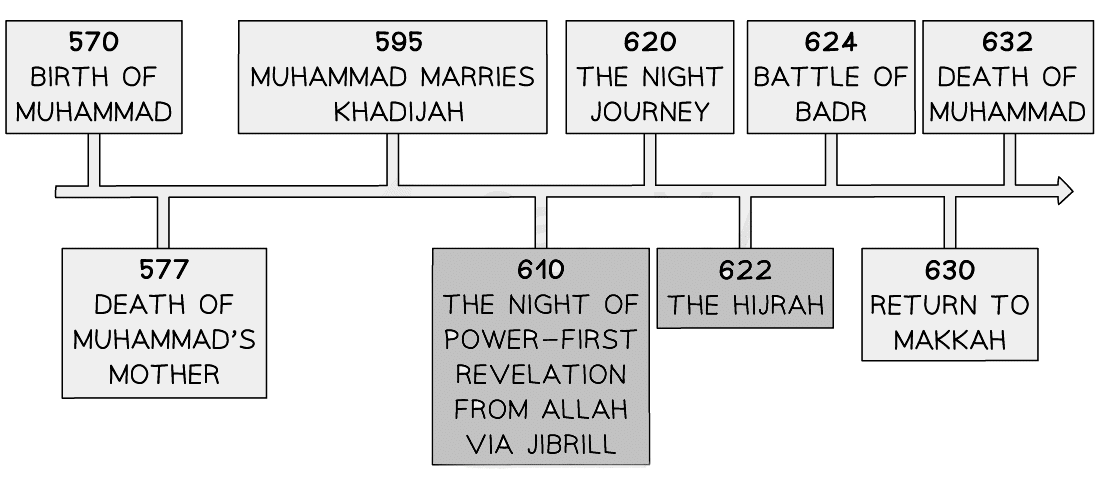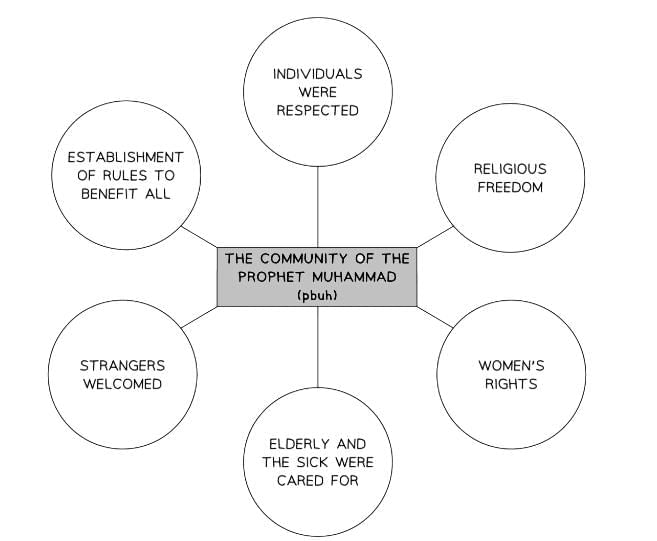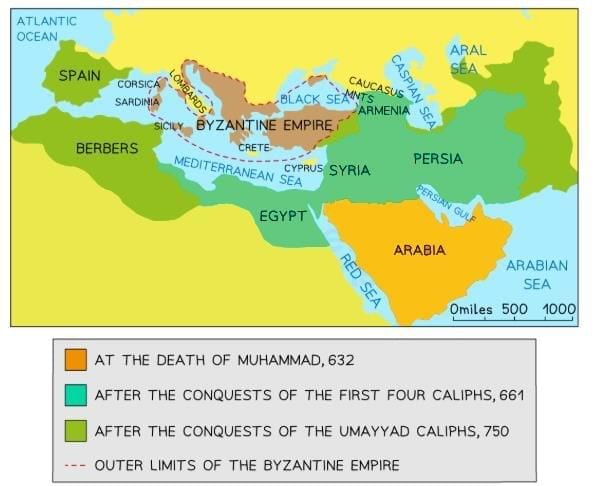Risalah | Religion, Philosophy & Ethics for GCSE/IGCSE - Year 11 PDF Download
| Table of contents |

|
| Introduction |

|
| The Role and Significance of Prophet Adam |

|
| The Role and Significance of Prophet Ibrahim |

|
| The Role and Significance of Prophet Muhammad (PBUH) |

|
Introduction
Risalah refers to the concept of prophethood in Islam, where Allah selects specific individuals to convey His divine messages to humanity.
Core Beliefs of Risalah
- Allah communicates His revelations to chosen prophets through angels.
- Numerous prophets have been appointed by Allah to spread the message of Islam.
- The Qur’an identifies 25 significant prophets, including Adam, Ibrahim (Abraham), Musa (Moses), Isa (Jesus), and Muhammad (peace be upon him).
- It is believed that 124,000 prophets contributed to the development of Islam over time.
- Prophet Muhammad (peace be upon him) is considered the final prophet, referred to as ‘The Seal of the Prophets.’
- Earlier divine messages, before Muhammad, were altered or lost over time.
- Judaism and Christianity hold some elements of truth but do not retain the original divine messages.
- Throughout history, Allah provided holy books to guide humanity, including:
- The Suhuf of Ibrahim.
- The Tawrat of Musa.
- The Zabur of Dawud (David).
- The Injil (Gospels) of Isa (Jesus).
- Allah chose Muhammad (peace be upon him) to receive revelations that formed the Qur’an, which was recorded to prevent alteration, eliminating the need for further prophets.
- The Qur’an is regarded as the direct, unaltered word of Allah, providing comprehensive guidance for humanity to succeed in the test for the afterlife.
- Prophets are categorized as:
- Rasul: Messengers who receive divine revelations to share universally.
- Nabi: Prophets who receive revelations relevant to their immediate communities.
- Risalah is a fundamental aspect of Islamic belief, forming one of the six articles of faith for Sunni Muslims and one of the five roots for Shi’a Muslims.
- All prophets are equally significant as they delivered the same divine message.
- The role of prophets includes:
- Acting as intermediaries between Allah and humanity by conveying His message.
- Exemplifying the application of this message through their lives, guided by Allah.
- Leading their communities to live according to Allah’s will.
- Prophets were sent to correct humanity when they strayed, misunderstood, or altered Allah’s message, guiding them back to the correct path.
The Role and Significance of Prophet Adam
Prophet Adam
- Adam was uniquely created by Allah and granted authority over the earth, as stated in the Qur’an (2:30): “I am indeed going to appoint a vicegerent on the earth.”
Allah formed Adam from clay and breathed life into him (Qur’an 38:71-72).
- As the first human to communicate with Allah, Adam is considered the first Muslim and prophet.
- Allah endowed Adam with knowledge, teaching him the names of all things, along with language, communication skills, and the ability to reason, evaluate, and make choices.
- Allah commanded angels and jinn to bow to Adam, signifying his importance.
- Adam lived with his wife, Hawwa (Eve), in a paradise garden for companionship.
- The Qur’an mentions that Allah had all of Adam’s descendants bear witness to His lordship before their creation.
- The story of Adam in the Qur’an is pivotal to understanding human destiny.
- Allah permitted Adam and Hawwa to enjoy the garden’s bounties but forbade them from eating from a specific tree.
- Iblis tempted them to eat the forbidden fruit, leading to their disobedience and awareness of their nakedness, which they covered.
- As a consequence, Allah banished them to Earth but forgave them after they sought mercy.
- On Earth, Adam received divine guidance to teach others about Allah.
- With angelic assistance, Adam constructed the Ka’aba as the first place of worship after arriving on Earth.
- Adam and Hawwa had many children, notably Qabeel (Cain) and Habeel (Abel), whose conflict, with Qabeel killing Habeel, highlighted humanity’s capacity for evil.
- Upon his death, Adam appointed his son Seth as his successor, though his descendants later dispersed.
The Role and Significance of Prophet Ibrahim
Prophet Ibrahim
- Ibrahim (Abraham) is revered for his unwavering obedience to Allah, as noted in the Qur’an (16:120): “Abraham was truly an example: devoutly obedient to God and true in faith.”
- Known as a Hanif and Khalil (friend of Allah), he is considered the father of the Arabs and all prophets.
- Ibrahim, along with his son Isma’il, built the Ka’aba, the most sacred site in Islam, under Allah’s command.
- Ibrahim established the Hajj pilgrimage and its associated rituals.
- His life serves as a model for Muslims on living righteously.
The Life of Ibrahim
- Ibrahim’s steadfast loyalty to Allah is evident in his actions.
- Married to Sarah, who was barren, Ibrahim took Hajar as a second wife, who bore his son Isma’il, whom he deeply loved.
- In a divine test, Ibrahim dreamt he was to sacrifice Isma’il. Both agreed to comply, but Allah provided a ram to sacrifice instead, as they passed the test.
- Allah instructed Ibrahim to leave Hajar and Isma’il in a barren valley. Despite hardships, their faith led to Allah providing a well when they ran out of water.
- In gratitude, Ibrahim and Isma’il built or rebuilt the Ka’aba.
- Isma’il succeeded Ibrahim as a prophet, leading the first community in Makkah.

The Role and Significance of Prophet Muhammad (PBUH)
Prophet Muhammad (PBUH)
- Muhammad (peace be upon him) is the final prophet of Islam, known as the ‘Seal of the Prophets’ (Qur’an 33:40).
- His revelations, recorded in the Qur’an, are considered the precise and unaltered word of Allah.
- His prophethood is affirmed in the Shahada, where Muslims declare him as Allah’s messenger.
- Muhammad’s life serves as a guide for Muslims, portraying him as the ideal human, husband, and leader. Many emulate him through extra prayers, simple living, and charity.
- Born in 570 CE, Muhammad faced early hardships, losing his father before birth and his mother at age six.
- He worked as a shepherd for his grandfather and later as a merchant for his uncle.
- By age 40, married to Khadijah with children, he was a successful and respected businessman.
- In 610 CE, at age 40, Muhammad was called to prophethood while meditating in a cave on Mount Hira, where the angel Jibril delivered Allah’s message, commanding him to “Recite!” despite his initial inability to read.
- After the revelation, shaken, he confided in Khadijah.
- Over the next three years, Muhammad continued receiving revelations during periods of meditation.

The Life of Muhammad (PBUH)
- Allah instructed Muhammad to preach Islam first to his family and friends, then to the people of Makkah, emphasizing monotheism.
- Makkah’s people had strayed from Allah’s path, engaging in immoral practices like cheating, gambling, prostitution, and idol worship, and had altered or lost earlier revelations.
- Muhammad challenged these practices, facing persecution from Makkah’s leaders.
- Facing threats, he migrated to Madinah (the Hijrah) in 622 CE, where he became the spiritual and political leader, establishing the first Islamic community.
- After numerous battles, he successfully converted Makkah to Islam by 630 CE.
- Muhammad passed away in 632 CE.
The Impact of Prophet Muhammad (PBUH) Today
As an Individual
- Muslims view Muhammad as the perfect example of devotion to Allah.
- They strive to adopt his qualities, including responsibility, determination, patience, courage, honesty, trustworthiness, and self-discipline.
- His humility, care, and faith in Allah during challenges inspire Muslims across all societal levels.
As a Leader
- Muhammad is regarded as an exceptional political and religious leader, seamlessly blending both roles.
- He established a community that followed his religious, social, and military leadership.
- Ten thousand men fought for him in Makkah, and the Islamic Empire expanded across southern Europe, northern Africa, and Asia in his name.

- Today, approximately 3 billion Muslims honor his name daily, and his life is studied globally.
- His leadership inspires Muslim political and religious leaders.

As a Family Man
- Muhammad is seen as the ideal family man, following the example of prophets like Adam, Noah, Lut, Jacob, and Ibrahim.
- The Qur’an emphasizes the importance of family, with Muhammad stating, “The best of you is he who is best to his family” (Hadith).
- He maintained a strong family unit, loving and caring for his wife Khadijah, her extended family, and his subsequent wives, treating them justly and performing household duties.
- He educated his four daughters, arranged good marriages for them, and was a devoted grandfather.
- Despite losing his sons, his faith sustained him, and he remained a loving father.
- Muslims draw on his example to guide their family interactions.
As a Teacher
- Muhammad is considered the greatest teacher due to his words and actions.
- He lived Islam fully, serving as a model for others to follow.
- He taught with clarity and authority, making learning accessible.
- Despite facing rejection, hatred, and violence in Makkah for thirteen years, his patience and method led to significant societal changes.
- His early teachings emphasized monotheism and judgment based on behavior, with later revelations detailing Muslim conduct.
- His Sunnah, recorded in the Hadith and Sira, remains a source of Islamic law (Shariah).
- Muhammad’s influence as a teacher continues to shape Islamic thought and practice worldwide.
The document Risalah | Religion, Philosophy & Ethics for GCSE/IGCSE - Year 11 is a part of the Year 11 Course Religion, Philosophy & Ethics for GCSE/IGCSE.
All you need of Year 11 at this link: Year 11
|
172 docs|3 tests
|
FAQs on Risalah - Religion, Philosophy & Ethics for GCSE/IGCSE - Year 11
| 1. What is the significance of Prophet Adam in religious teachings? |  |
Ans. Prophet Adam is considered the first human being and the first prophet in many religious traditions. His significance lies in his role as the father of humanity and the first to receive divine guidance. Adam's creation from clay signifies the connection between humans and the earth, and his story emphasizes themes of obedience, repentance, and the importance of following God's commandments.
| 2. How does Prophet Ibrahim's story contribute to the understanding of monotheism? |  |
Ans. Prophet Ibrahim, known as Abraham in Judeo-Christian traditions, is a central figure in the establishment of monotheism. His unwavering faith in a single God, rejection of idolatry, and willingness to sacrifice his son in obedience to God's command illustrate the importance of devotion and trust in divine will. Ibrahim's covenant with God and the establishment of rituals, such as pilgrimage, further solidify his role as a key figure in the promotion of monotheistic beliefs.
| 3. What are the essential teachings of Prophet Muhammad (PBUH) that impact Muslim life? |  |
Ans. Prophet Muhammad (PBUH) is regarded as the last prophet in Islam, and his teachings encompass a comprehensive way of life. Key teachings include the importance of faith in one God, the significance of prayer, charity, and ethical conduct. His life serves as a model for Muslims in areas such as social justice, compassion, and community service. The concept of Risalah, or prophethood, underscores the importance of following his example and adhering to the principles of Islam.
| 4. In what ways do the lives of these prophets influence contemporary religious practices? |  |
Ans. The lives of Prophet Adam, Prophet Ibrahim, and Prophet Muhammad (PBUH) continue to influence contemporary religious practices through their teachings and examples. For instance, the concept of repentance and seeking forgiveness from Adam's story is reflected in daily prayers. Ibrahim's commitment to God is commemorated during the pilgrimage and the festival of Eid al-Adha. Muhammad's teachings form the basis of Islamic law and ethics, guiding the moral and social frameworks of Muslim communities today.
| 5. How do the narratives of these prophets contribute to interfaith dialogue? |  |
Ans. The narratives of Prophet Adam, Prophet Ibrahim, and Prophet Muhammad (PBUH) serve as common ground for interfaith dialogue, emphasizing shared values such as creation, faith, and moral responsibility. Recognizing these figures across different religious traditions fosters understanding and respect among diverse faith communities. Their stories highlight the universal themes of obedience to God, the importance of compassion, and the pursuit of justice, which can bridge gaps between religions and promote peaceful coexistence.
Related Searches














